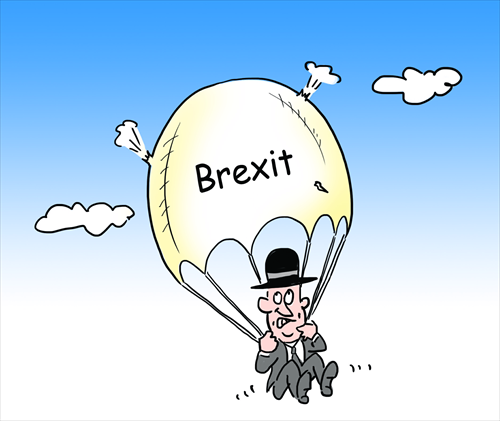HOME >> OP-ED
Brexit lays bare Western democracy’s façade
By John Ross Source:Global Times Published: 2016/7/10 19:08:01

Illustration: Liu Rui/GT
Britain's referendum vote for Brexit has created the deepest UK political crisis since WWII. Britain's unity is threatened. This crisis will continue for many years. "I'd like to apologise to the British people for the state our politics is in" were the words of Anna Soubry, UK Business Minister. This led to debate in China on Western democracy, populism, and separatism. Therefore, it is important to analyse the connection between these immediate events and their deepest causes.The key to understanding the UK's apparently chaotic developments is that they confirm Western democracy is a façade behind which powerful economic groups really decide issues. This makes otherwise inexplicable events clear.
First, despite the referendum, Britain is still an EU member. The key Brexit leaders oppose any rapid formal application to leave the EU which can only be done under Article 50 of the EU Treaty. Major UK political figures, including Tony Blair, have stated there must be a new referendum or election before Britain could leave the EU.
Factually reversing a referendum decision would be the fifth time the EU has done this. Referendums producing results in line with the policies of the dominant EU economic groups are declared "democratic decisions," but referendums producing the "wrong" results for dominant economic groups are overturned, such as in Denmark, Sweden, France and Ireland.
This reality links the chaos around the EU referendum to their deeper causes.
The majority of Britain's powerful favoured EU membership. They were supported by the US president and every EU countries leader. These forces could only be replaced by an equally powerful social force capable of governing Britain - which does not exist.
The defeat of these forces in the June 23 referendum therefore unleashed chaos, as the pro-Brexit forces were incoherent "populists" who were against various things with no positive idea what they were for. This underlay the rapid exit of the Brexit referendum leaders, Boris Johnson and Michael Gove, from being contenders for the Conservative Party leadership and prime minister.
The deepening crisis, plus the Brexiters' incoherence, therefore allowed representatives of dominant economic groups to envisage a new referendum.
The ultimate cause of this political crisis is that the "Western democratic" model is based on an unreal picture of human beings. Real human beings have innumerable complex needs ranging from the most basic, such as escaping poverty and having personal security, up to complex fields of culture and science. Real human rights consist of their ability to pursue these goals.
But the Western model replaces this reality with a fantasy unidimensional view that human beings are primarily only concerned with a single narrow political range of issues, and their "human rights" exclusively concern these. When the results of votes in this unreal Western democratic system conflict with the real economic and social forces, as with the EU referendum, they therefore produce chaos or are even overturned.
The lessons for China are extremely important. China is even more complex than Britain. China is a developing country, with a vast population, a multi-ethnic society, and faced with hostile neighbors such as Japan and attempts to stop its rise by US neo-cons.
For China, to abandon its own system of integrating these many different elements in the national way forward, and adopt the false picture of human beings and human needs underlying the Western democratic model, would therefore lead China into dangerous chaos.
This has lessons for the Communist Party of China (CPC), this month celebrating its 95th anniversary.
Since 1949, China has been brought from one of the world's poorest countries, subject to foreign invasion for a century, to a great power capable of defending China's independence.
It produced the most rapid economic growth in a major country in human history, raised 728 million people from internationally-defined poverty while the rest of the world achieved only 152 million, and brought China to the threshold of a high income economy by international criteria. These constitute the greatest contribution to real human rights by any country. The CPC therefore bares a tremendous historic responsibility.
These historically unparalleled achievements were gained because the CPC based itself on the multifaceted reality of society and its specific features in China. It understood China's complex real social relations and how to develop these in a relatively integrated way to maintain the cohesion without which China cannot develop - China's need for economic development, its need to create social and personal security, the need to develop national culture and science.
To do this, it rightly rejected the actually fraudulent picture in the Western system that human beings are unidimensional, interested only in a narrow number of "political" issues, and not primarily concerned with their all-round development, including their right to pursue their nationally chosen way of life.
China should very carefully study the system producing the political chaos surrounding the EU referendum to avoid its mistakes.
The author is a senior fellow at the Chongyang Institute for Financial Studies, Renmin University of China. opinion@globaltimes.com.cn
Posted in: Viewpoint